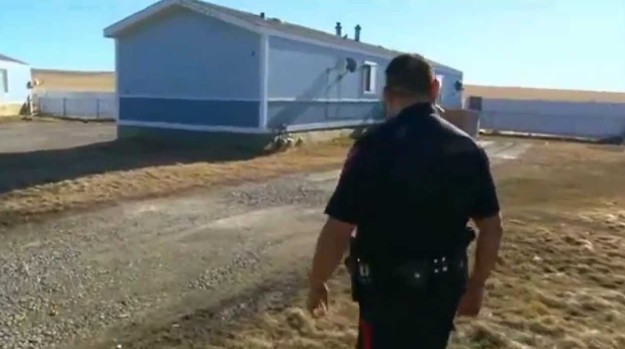
A new no trespassing sign stands at the side of a highway entrance to Blood First Nation in southern Alberta. The band council hopes to crack down on fentanyl trafficking. (Raffy Boudjikanian/CBC)
Kainai council hopes to crack down on drug dealers on its Alberta territory
CBC News: May 16, 2017
An Alberta First Nation has passed a bylaw that forbids non-band members from entering without a permit and charges non-members who do business there extra fees — in a bid to put the brakes on high numbers of fentanyl-related deaths and overdoses.
“Some very serious drugs are killing our people, and one of the problems that our policing personnel encountered was the inability to be able to deal with outside individuals who … could go about freely on our lands,” said Chief Roy Fox of the Kanai First Nation.
The reserve 223 kilometres south of Calgary, also known as the Blood Tribe First Nation, is the largest in Canada, stretching some 1,400 square kilometres, all the way to Alberta’s U.S. border.
The First Nation declared a state of emergency in March 2015, after 20 people died and 60 suffered non-fatal overdoses in the previous six months.
Problem ‘anywhere and everywhere’
Eugena Chief Moon, 27, was one band member who died of an overdose later in 2015, leaving three children behind. Her loved ones are expressing hope the new bylaw will act as a deterrent against drug dealers.

Eugena Chief Moon was one of many Blood tribe members who died of a fentanyl overdose. (Kassidy White Feathers)
“It’s hard for me,” said her grandmother Myrna Chief Moon. “Because out of nowhere she disappeared. She’s still young, she’s still healthy, I still think Gena’s still around.”
“Because she’s not supposed to go.”
Eugena’s friend Kassidy White Feathers lives on a street in the reserve’s town site nicknamed “Oxy Alley” because of the frequent drug transactions there.
She said it has been cleaned up after police removed some dealers, but the situation on the reserve in general has only worsened.

Kassidy White Feathers (left) and Myrna Chief Moon comfort each other over the death of Eugena Chief Moon, their friend and granddaughter respectively. (Monty Kruger/CBC)
“I’d say it’s probably the worst I’ve ever seen it,’ she said. “It’s sad the way it’s turning out to be. A lot of people, kids, young kids, you know, elders, and it seems like anywhere and everywhere, that’s where it is.”
The reserve’s latest official numbers, from November 2016, say emergency services received 164 calls for overdoses since June 2014, though it is unknown how many of those were fatal.
“There was just death after death from overdose,” said Gayle Chase, a prescription drug co-ordinator on the reserve. “They used the fentanyl, not even really knowing what they were getting themselves involved with.”
White Feathers said she hopes the new bylaw will make a difference. “It’s not normal to have people overdosing every day, and it’s not normal for us to pretend it’s not happening to our loved ones,” she said.
Some dissent
A newly installed sign dots the side of Alberta Highway 2 south near the entrance to the First Nation. “Blood Indian Reserve: No Trespassing,” it reads, informing those who disobey they will be prosecuted, and demanding visitors obtain a valid permit.
There are those who disagree with the bylaw.
Donald Bottle owns a local business on the territory, and as a Blood member, he is exempt from the permit charges.

Local business owner Donald Bottle says the new bylaw unfairly infringes on the rights of those who visit the Blood Reserve to do business. (Monty Kruger/CBC)
But he believes the bylaw is an infringement of people’s rights. “Those that come to do business in the boundaries of the reservation, in the areas of gas, commodities, food to the store, it’s going to affect those that are supplying our goods to the reservation,” he said.
For the band council, though, that is a minor consideration in the face of the fentanyl crisis.
Chief Fox said the permit system will allow police to narrow down who should be rightfully present on Blood territory and who should not.
“What is more important?” he asked. “Saving the lives of our people, our young people, or making it inconvenient or convenient for some of our friends and visitors who come to visit us?”











